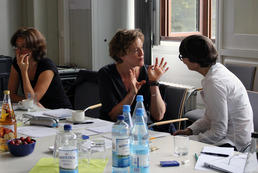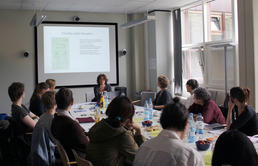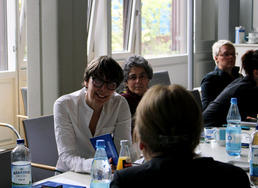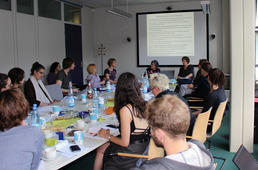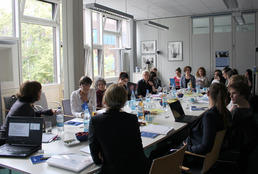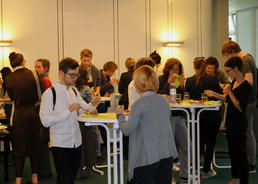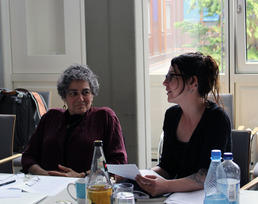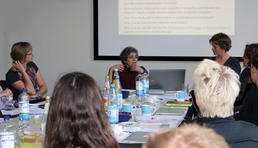The Body in Contemporary Theory
Alice Lagaay & Marie-Luise Angerer
Bildquelle: FSGS
Claudia Breger
Bildquelle: FSGS
Marie-Luise Angerer
Bildquelle: FSGS
Workshop Bodies and / as Fabrication
Bildquelle: FSGS
Workshop Bodies and / as Fabrication
Bildquelle: FSGS
Workshop Bodies and / as Fabrication
Bildquelle: FSGS
Susan Lanser & Jule Govrin
Bildquelle: FSGS
Lecture Susan Lanser
Bildquelle: FSGS
Bodies and / as Fabrication
A workshop with international guests on the body in contemporary theory
Date: 10.07.2015Place: FU Berlin, Room JK 33/121
Conception: Irmela Krüger-Fürhoff
The human body is at the heart of many recent theoretical debates across the humanities. Literary studies, affect studies, narratology, media theories, philosophy of science and of the subject, gender and disability studies discuss the body’s formative and figurative role for the construction of identity and agency as well as for the fabrication of subjectivity and textuality. They also analyze the body’s ‘natural’, ‘technical’, precarious resp. ‘dysfunctional’ state of being, its consumption and production by repetition, and the importance of bodily perceptions and sensations. However, these theoretical approaches seem to draw on different, sometimes even competing concepts of the body, and some of them might even profit both from a more elaborate view of the body resp. embodiment and from inspiring conversations with ‘neighboring’ disciplines.
The workshop opened a dialogue between internationally acclaimed scholars who stand for different theoretical approaches to the body in literature and culture, PhD students who draw on these theories resp. readings in their dissertation projects, and the general academic public.
International Guests:
- Prof. Dr. Marie-Luise Angerer, Kunst und Medienwissenschaften, Kunsthochschule für Medien Köln
- Prof. Dr. Claudia Breger, Germanic Studies / Gender Studies, Indiana University
- Dr. Alice Lagaay, Philosophie, Universität Bremen
- Prof. Dr. Susan S. Lanser, English / Women’s and Gender Studies, Brandeis University
Organization:
Prof. Dr. Irmela Marei Krüger-Fürhoff & PhD students of Schlegel Graduate School
Conference proceedings:
The workshop Bodies and / as Fabrication. A workshop on the body in contemporary theory took place in the Schlegel School on the 10th of July, 2015. Invited guests were Prof. Claudia Breger from Indiana University, Bloomington; Prof. Marie-Luise Angerer from the Kunsthochschule für Medien in Cologne; Prof. Susan Lanser from Brandeis Unversity, Waltham; and Dr. Alice Lagaay from the Universität Bremen.
Claudia Breger opened the discussion with a paper that addressed the affective turn in theory and narratology. Drawing on affect studies, postmodern theory, and narratology, her point of entrance was not the body as fabrication, but as something pre-symbolic, yet always in a relation to textuality. Tapping into Deleuzian discourses, Breger attempted to outline a model that imbricates ontology, phenomenology and rhetoric, while remaining aware that the different bodies circulating in these fields are shaped by irreconcilable philosophical approaches. She proposed the term “world-making” as a means of integrating these fields. Breger suggested a layered model of bodily textuality that engages on an ontological level (inspired by affect studies) but at the same time considers historical and political approaches (informed by postmodern theory and cultural studies).
The second speaker was Marie-Luise Angerer, who began her talk with a citation from Brian Massumi (a constant reference for many workshop participants): “The skin is faster than the word.” Her purported aim was to think how our relation to the body and our notion of identity change under the influence of (bio)technology – to think Judith Butler and Donna Haraway together. Tracing the trajectory of her book Desire after Affect, Angerer critically observed a shift from sex to affect in today’s theoretical debates. She suggested that the vocabulary of psychoanalysis – which is often seen to be threatened by any theory that sidelines notions like the subject, desire, and the unconscious – can enrich insights from affect theory, which may be better suited to deal with our contemporary technological reality.
In an open discussion, Breger and Angerer focused on issues of definition, distinguishing between feeling, emotion and affect. Whereas feelings and emotions are personal, affect is something pre-individual which relates us to the world. Various terms have been suggested to approach this pre-individual dimension, including Kristeva’s semiotic and Malabou’s cerebral non-conscious. Instead of applying ‘affect’ as a putative master term, both Breger and Angerer suggested to use a variety of terms that open affect theory to a more political understanding of subjectivity and society.
After lunch, Susan Lanser presented a paper on the body in narratology. Starting from the observation that the body hardly figures in traditional narratological approaches, she addressed the media-specific conditions that allow for a corporeal ambiguity in literature that is not present in film and graphic novels. If narratology is the study of how texts construct meaning – a study that begins by bracketing the referential illusion –, we may analyze specific textual strategies that allow queer identities to emerge in literary texts. Lanser suggested that heterodiegetic narration and free indirect discourse may be some of these strategies, and discussed Kate Chopin's “The Story of an Hour” (1894) to illustrate some of her points.
Alice Lagaay gave the final presentation, in which she addressed voice and body as transitional phenomena. The voice is both individual and communal, both personal and shared; unique, but never resonating alone; both linguistic and non-linguistic; an index of that which cannot be fully expressed in language, but it also fully depends on language (as opposed to noise). Moreover, although the voice resounds, a voice is not a voice unless it can be silent. Lagaay then zoomed in on the different kinds of silence a voice can produce; there is a silence that means, and a silence that suspends meaning. She tried to approach this kind of silence with Blanchot’s notion of the night and Barthes’ notion of the neutral, notions that indicate a mute facticity of meaning which resonates with the pre-symbolic (and almost unthinkable) presence of the body.
Finally, the four speakers engaged in a lively discussion with the other workshop participants, addressing issues of definition, the absence of bodies in narratology, and the ways in which affect theory can be integrated into other disciplines or used to update or subvert the vocabularies of neurology and psychoanalysis. Above all, the wide divergence of theoretical positions that were expressed in this small workshop indicates the extent to which the question of the body has hardly been resolved, neither in literary studies nor in philosophy, and remains a fertile field for analysis and discussion.
Report: Dennis Schep
